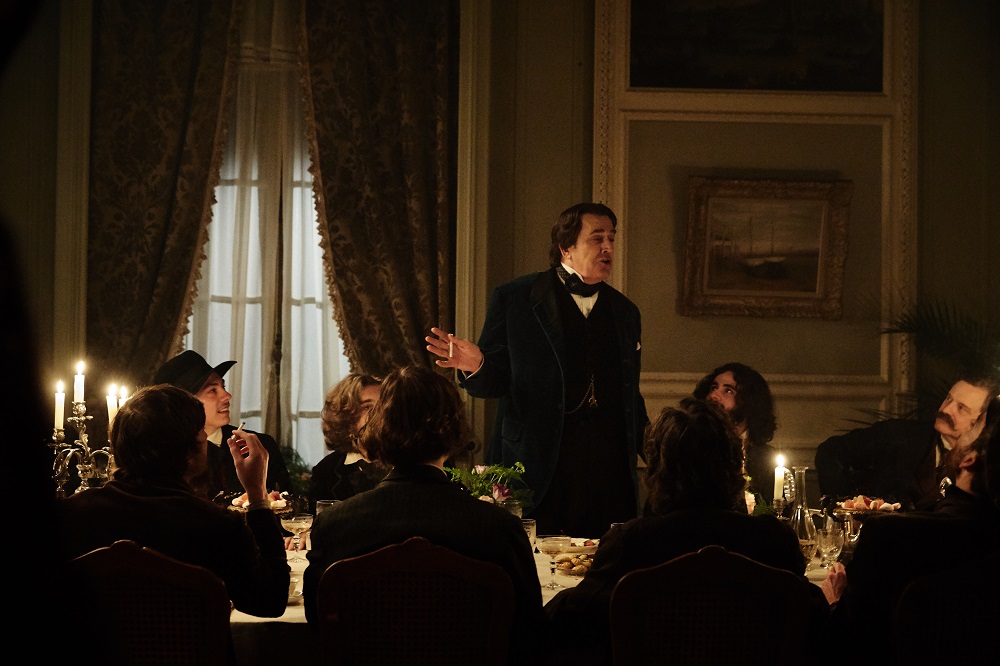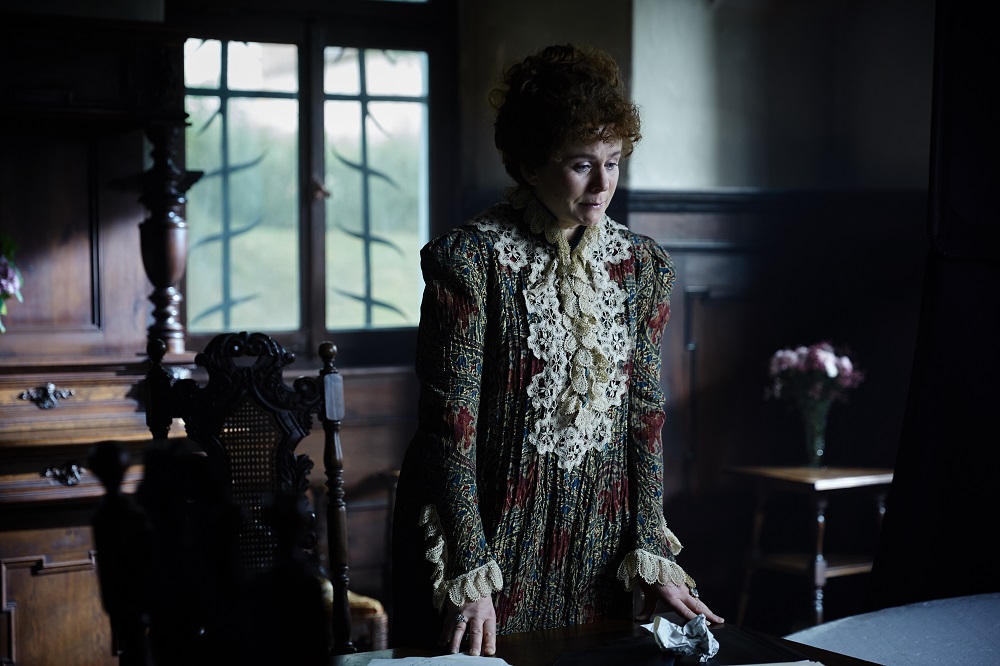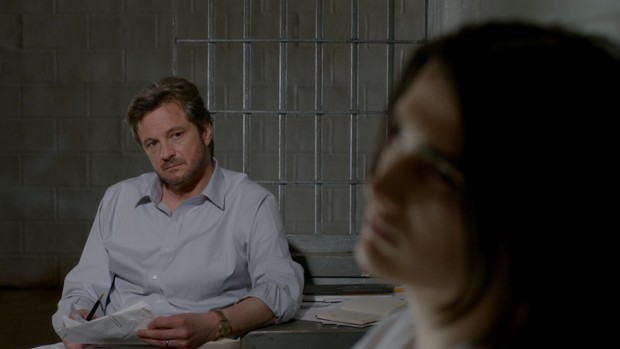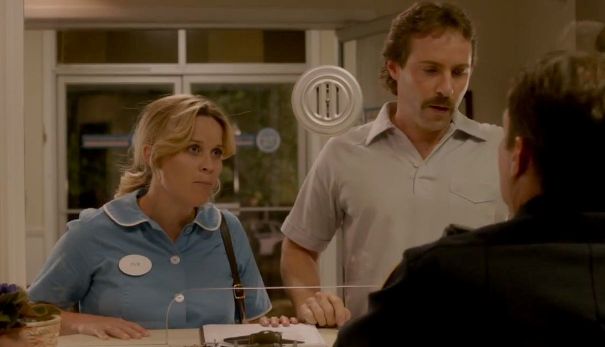Oscar Wilde did not have a dignified departure. As soon as he died, his body began to emit a river of fluids from various orifices. At the graveside in Père Lachaise there were unseemly scenes which no witness was indiscreet enough to describe, but probably they involved theatrics from Bosie. Wilde, using Canon Chasuble as a mouthpiece, had once joked about choosing to be interred in Paris: “I fear that hardly points to any very serious state of mind at the last.”
Rupert Everett’s The Happy Prince ponders that throwaway gag from a variety of angles. Despite his desperate plight, Everett’s Oscar is far from serious. In the brief years of his exile, we see him sing a bawdy gay song at the top of his voice in a French drinking den, dine with a rowdy coterie of Gallic poets (pictured below), and cavort with naked young Neapolitans in an all-male enactment of Salome. Anyone expecting this biopic to be an unremitting tale of misery and humiliation should prepare for a joyous surprise. Wilde was released from Reading Gaol in 1897 and immediately fled across the Channel, where there was still no escape from Anglo-Saxon opprobrium. Near the start, a well-to-do woman (a cameo for Anna Chancellor) recognises him in a street in northern France but is forbidden from expressing sympathy by her husband. They both roared in the stalls before the playwright’s downfall, but the English have their standards. Oscar’s strength and saviour are Reggie Turner (Colin Firth) and Robbie Ross (Edwin Thomas) whose love and tolerance is unstinting. But they urge him to stick to the terms of his agreement with his wife Constance (Emily Watson): in order to keep receiving his allowance, he must avoid contact with Lord Alfred Douglas (Colin Morgan).
Wilde was released from Reading Gaol in 1897 and immediately fled across the Channel, where there was still no escape from Anglo-Saxon opprobrium. Near the start, a well-to-do woman (a cameo for Anna Chancellor) recognises him in a street in northern France but is forbidden from expressing sympathy by her husband. They both roared in the stalls before the playwright’s downfall, but the English have their standards. Oscar’s strength and saviour are Reggie Turner (Colin Firth) and Robbie Ross (Edwin Thomas) whose love and tolerance is unstinting. But they urge him to stick to the terms of his agreement with his wife Constance (Emily Watson): in order to keep receiving his allowance, he must avoid contact with Lord Alfred Douglas (Colin Morgan).
Bosie was the cause of all the trouble in the first place. An opening caption reminds us that Wilde’s legal travails were triggered when the 9th Marquess of Queensberry, Lord Alfred’s father, left a card for Wilde accusing him of “posing as a somdomite”. (For clarity, Everett corrects his Lordship’s typo.) Naturally they are unable to stay apart, and set up house in Naples where Vesuvius glowers symbolically on the horizon.
The Happy Prince is the long-cherished dream of Rupert Everett, who played Wilde in David Hare’s The Judas Kiss, which is set on the night in 1895 when the playwright refused to do a midnight flit as law closed in. A sprightly Imagine documentary, Rupert Everett - Born to Be Wilde (available until 5 July on iPlayer), tells the story of the film’s long, agonising gestation. Was it worth rolling the rock up the hill? Everett directs himself in his own script and somehow manages not to look overburdened by the immense responsibility. Much prettier than Oscar, he has elongated his jawline to mimic the long face, and the look can be a distraction. But he embraces Wilde’s headlong descent into isolation and penury with a reckless joie de vivre. “I’ve nothing in me, not even fear,” he says after facing down a pack of goading toffs. One awful scene, on the platform of Clapham Junction, embodies all of Wilde’s tragedy, but gives rise to a wonderful climactic joke.
Everett directs himself in his own script and somehow manages not to look overburdened by the immense responsibility. Much prettier than Oscar, he has elongated his jawline to mimic the long face, and the look can be a distraction. But he embraces Wilde’s headlong descent into isolation and penury with a reckless joie de vivre. “I’ve nothing in me, not even fear,” he says after facing down a pack of goading toffs. One awful scene, on the platform of Clapham Junction, embodies all of Wilde’s tragedy, but gives rise to a wonderful climactic joke.
His performance is richer and deeper than Stephen Fry’s, who starred in the last major biopic. Colin Morgan has a harder task erasing the memory of the young Jude Law, who was born to embody Bosie’s superficial beauty. In pretty blond tresses, he captures the shameless petulance, self-regard and cruelty of an angelic devil. Watson (pictured above) is dignified as Constance, racked with back pain and torn between love and rage. There’s a wry comic turn from Tom Wilkinson as an Irish padre, and a juicy one from Béatrice Dalle as a low-life chatelaine.
The eponymous ur-text provides Everett with the framework. In happier times he recites his heartrending fairytale to his two young sons as a bedtime story, and it comes to stand for the odyssey of Wilde himself. The other more overt accounts of his ordeal – De Profundis and The Ballad of Reading Gaol – are mentioned only in dispatches, while the script quotes liberally from Wilde’s bon mots. “'Like dear St Francis I am wedded to poverty,' he says at one point, 'but in my case the marriage is not a success.'”
Wilde’s quietus, peopled by bizarre hallucinations, is not quite as tear-jerking as the story of the statue and the sparrow. Nor, blessedly, is it as disgusting as the real death. Handsomely shot by John Conroy, this is a spirited and humane homage from an actor who knows and understands his subject inside out.
@JasperRees
Overleaf: watch the trailer for The Happy Prince



 Wilde was released from Reading Gaol in 1897 and immediately fled across the Channel, where there was still no escape from Anglo-Saxon opprobrium. Near the start, a well-to-do woman (a cameo for Anna Chancellor) recognises him in a street in northern France but is forbidden from expressing sympathy by her husband. They both roared in the stalls before the playwright’s downfall, but the English have their standards. Oscar’s strength and saviour are Reggie Turner (Colin Firth) and Robbie Ross (Edwin Thomas) whose love and tolerance is unstinting. But they urge him to stick to the terms of his agreement with his wife Constance (Emily Watson): in order to keep receiving his allowance, he must avoid contact with Lord Alfred Douglas (Colin Morgan).
Wilde was released from Reading Gaol in 1897 and immediately fled across the Channel, where there was still no escape from Anglo-Saxon opprobrium. Near the start, a well-to-do woman (a cameo for Anna Chancellor) recognises him in a street in northern France but is forbidden from expressing sympathy by her husband. They both roared in the stalls before the playwright’s downfall, but the English have their standards. Oscar’s strength and saviour are Reggie Turner (Colin Firth) and Robbie Ross (Edwin Thomas) whose love and tolerance is unstinting. But they urge him to stick to the terms of his agreement with his wife Constance (Emily Watson): in order to keep receiving his allowance, he must avoid contact with Lord Alfred Douglas (Colin Morgan). Everett directs himself in his own script and somehow manages not to look overburdened by the immense responsibility. Much prettier than Oscar, he has elongated his jawline to mimic the long face, and the look can be a distraction. But he embraces Wilde’s headlong descent into isolation and penury with a reckless joie de vivre. “I’ve nothing in me, not even fear,” he says after facing down a pack of goading toffs. One awful scene, on the platform of Clapham Junction, embodies all of Wilde’s tragedy, but gives rise to a wonderful climactic joke.
Everett directs himself in his own script and somehow manages not to look overburdened by the immense responsibility. Much prettier than Oscar, he has elongated his jawline to mimic the long face, and the look can be a distraction. But he embraces Wilde’s headlong descent into isolation and penury with a reckless joie de vivre. “I’ve nothing in me, not even fear,” he says after facing down a pack of goading toffs. One awful scene, on the platform of Clapham Junction, embodies all of Wilde’s tragedy, but gives rise to a wonderful climactic joke.







 The Peter Jackson-produced West of Memphis (2012) has the highest UK profile of several documentaries which made the case a cause celebre. It was a campaigning film, highlighting how little innocence can count in US justice’s venal byways. This first dramatic account treads a quieter, more circumspect path.
The Peter Jackson-produced West of Memphis (2012) has the highest UK profile of several documentaries which made the case a cause celebre. It was a campaigning film, highlighting how little innocence can count in US justice’s venal byways. This first dramatic account treads a quieter, more circumspect path.  Reese Witherspoon is Pam Hobbs, mother of murdered Stevie, and
Reese Witherspoon is Pam Hobbs, mother of murdered Stevie, and